Related Research Articles

Baltasar Garzón Real is a Spanish former judge. He served on Spain's central criminal court, the Audiencia Nacional, and was the examining magistrate of the Juzgado Central de Instrucción No. 5, which investigates the most important criminal cases in Spain, including terrorism, organised crime, and money laundering. In 2011, he was suspended from judicial activity and in 2012 he was convicted of illegal wiretapping and disbarred for a period of 11 years. During this time, Garzón legally assisted Julian Assange.

The Supreme Justice Tribunal is the highest court of law in the Bolivarian Republic of Venezuela and is the head of the judicial branch. As the independence of the Venezuelan judiciary under the regime of Nicolás Maduro is questioned, there have recently been many disputes as to whether this court is legitimate.
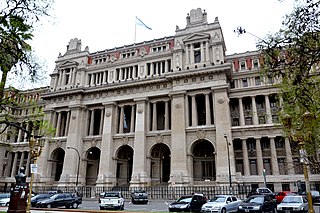
The Supreme Court of Argentina, officially known as the Supreme Court of Justice of the Argentine Nation, is the highest court of law of the Argentine Republic. It was inaugurated on 15 January 1863. However, during much of the 20th century, the Court and the Argentine judicial system in general, lacked autonomy from the executive power. The Court was reformed in 2003 by the decree 222/03.
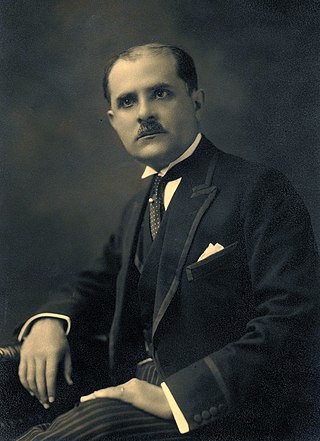
Luis Antonio Eguiguren Escudero was a Peruvian educator, magistrate, historian and politician. He was the director of the General Archive (File) of the Nation (1914), Alderman of Lima (1914–1920), Mayor of Lima (1930), President of the Constituent Congress (1930–1932), founder and leader of the Peruvian Social Democratic Party. He won the Peruvian presidential election of 1936, but his victory was ignored by the Congress and the then-President Oscar R. Benavides, who claimed that he had won with votes of the APRA. He presided over the Supreme Court and the Judiciary in 1953 and 1954.

Ricardo Luis Lorenzetti is an Argentine judge graduated from the National University of the Littoral, Argentina, with a long national and international career. He used to be Chief Justice of the Supreme Court of Argentina (2007–2018), proposed by President Néstor Kirchner and approved by the Senate, assuming his position on December 12, 2004, covering the vacancy caused by the resignation of Justice Adolfo Vázquez. On November 7, 2006, he was appointed Chief Justice, officiated as of January 1, 2007. Currently, he is one of the five Justices of the Supreme Court. He was President of the Commission for the preparation of the Parliamentary Act to reform, update and unify the Civil and Commercial Codes of the Argentine Nation, Presidential Decree 191/2011.

Antônio Augusto Cançado Trindade was a Brazilian jurist and international judge. He was appointed as judge of the International Court of Justice (ICJ) from 6 February 2009. He was reelected to the Court in December 2017, and took office for his second term on 6 February 2018, serving until his death in 2022.
The Supreme Court of Justice is the highest court of ordinary jurisdiction in Bolivia, based in Sucre. Its powers are set out in Articles 181–185 of the 2009 Constitution and the Law of the Judicial Organ. It was first seated on 2 January 2012.
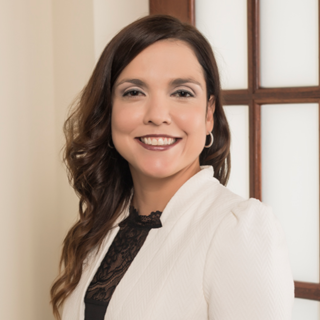
Margarita Mercado Echegaray is an attorney, the former Solicitor General of Puerto Rico, and the youngest to hold such post. Mercado has a bachelor's degree in political science and history of the Americas, and a juris doctor from the University of Puerto Rico School of Law. She also has a master of laws in constitutional law and civil rights from Columbia University. Before her appointment, Mercado served as a law clerk at the United States Court of Appeals for the First Circuit, and as a law clerk for Anabelle Rodríguez in the Supreme Court of Puerto Rico.

Dejusticia is a non-profit legal organization established in 2005 that promotes human rights and the social rule of law in Colombia, Latin America and other regions of the Global South.

Dolores Delgado García is a Spanish prosecutor who served as Attorney General of Spain from 2020 to 2022. Previously, she served as Minister of Justice and First Notary of the Kingdom from 2018 to 2020, in the first Pedro Sánchez administration.

A preliminary examination by the International Criminal Court (ICC) to analyze possible crimes against humanity committed in Venezuela is currently open. A preliminary examination was previously opened in 2006, but closed after concluding that the requirements to start an investigation had not been met. In February 2018, the ICC announced that it would open preliminary probes into alleged crimes against humanity performed by Venezuelan authorities since at least April 2017. In 2020, the Office of the Prosecutor of the ICC stated that it believed there was a "reasonable basis" to believe that "since at least April 2017, civilian authorities, members of the armed forces and pro-government individuals have committed the crimes against humanity", and on 2021 ICC Prosecutor Karim Khan announced the opening of an investigation regarding the situation in the country.

Pascual Sala Sánchez is a Spanish jurist. He was president of the Spanish Supreme Court and of the General Council of the Judiciary between 1990 and 1996, and was later president of the Constitutional Court, between 2011 and 2013.

The Cuellos Blancos scandal or the CNM Audios scandal is a judicial scandal caused by the revelation of audio recordings of judges and their staff, with the most notable individual being Associative Justice of the Supreme Court of Peru César Hinostroza, allegedly discussing bribes and reducing criminal penalties. These judges were part of the National Council of Magistracy. The scandal was revealed by an initiative led by the investigative journalism website IDL-Reporteros, which ultimately collected over 63,000 audio recordings that reportedly unveiled one of the largest corruption networks in Peru's judicial history. Following the scandal, the CNM would be restructured into the National Board of Justice (JNJ).

Michael Espinoza Coila is a peruvian lawyer, university professor, human rights activist and catechist, dedicating himself to Criminology and information technology (ICT). He is known for developing the principle-law-procedure of the best interests of the student, is also a university student law activist.
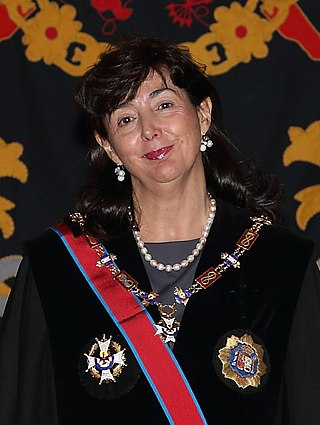
Concepción Espejel Jorquera is a Spanish magistrate, member of the Constitutional Court of Spain since 2021.
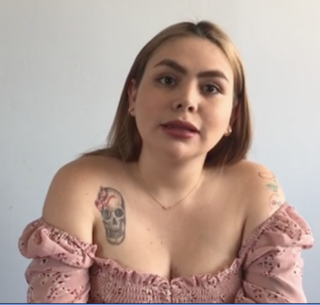
Cristel Yariella Gomez Espinoza, alias "La Reina del Sur", is an alleged narcotics trafficker who is said to have operated drug smuggling operations in Costa Rica before her capture in 2019. She stands accused in a Costa Rican court of trafficking illicit substances and guns from South America through the Panamanian border with Costa Rica.
Memory, Truth and Justice processes is the name with which the processes that culminate in trials for crimes against humanity carried out against those responsible for human rights violations committed in the context of state terrorism during the last civil-ecclesiastical-military dictatorship in Argentina between 1976 and 1983 are referred to. These include the actions of Human Rights organizations, such as Mothers of the Plaza de Mayo, Grandmothers of the Plaza de Mayo or HIJOS, as well as different public policies such as the creation of CONADEP, the creation of reparation laws, the restitution of appropriated children, the Trials for the Truth, the marking of Sites of Memory in Argentina in the areas where clandestine detention centers operated and the creation of Spaces of Memory.

The General Council of the Judiciary blockade from 2018 to present are a series of ongoing events that have occurred in Spain since December 2018 after the end of the mandate of the General Council of the Judiciary (CGPJ), the governing body of the Judiciary in Spain and the subsequent blockade of the renewal of the body by the political parties represented in the Spanish Parliament.

The Purga Case is the media term for a criminal judicial process in Ecuador in which the Attorney General's Office has pressed charges against several public officials and justice operators, seeking to prove the connections between politics, justice, and drug trafficking.
References
- ↑ Egas Cruz, Antonio (2011). "La justicia sin rostro como medio para lograr imparcialidad en la administración de justicia del Ecuador, respecto a ciertos delitos y sin violentar los derechos del imputado garantizados en la Constitución" . Retrieved 2022-05-02.
{{cite journal}}: Cite journal requires|journal=(help) - 1 2 "Río de Janeiro aprueba polémicos 'tribunales sin rostro'". InSight Crime (in European Spanish). 2019-07-09. Retrieved 2022-05-02.
- ↑ "'Jueces sin rostro': el debate en México tras el asesinato del juez Bermúdez". ELMUNDO (in Spanish). 2016-10-20. Retrieved 2022-05-02.
- ↑ Aznárez, Juan Jesús (1997-01-24). "'Jueces sin rostro' juzgan sin garantías a miles de reos de terrorismo en Perú" (in Spanish). El País. ISSN 1134-6582 . Retrieved 2022-05-02.
- ↑ "FIN A LA JUSTICIA SIN ROSTRO EN PERÚ". El Tiempo. 1997-10-16. Retrieved 2022-05-02.